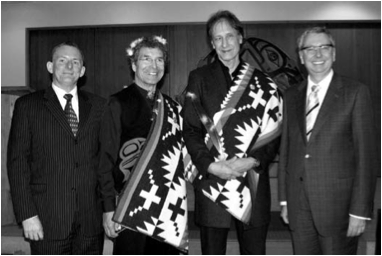
Left to right: Ian Cull, UBC Okanagan Associate Vice President, Students; Dr. Richard Vedan, previous FNHL Director; Dr. Linc Kesler, new FNHL Director; Dr. Stephen Toope, UBC President; at the "Passing on Responsibility for the Longhouse" ceremony held on March 10, 2009. Photo by Mar-y-paz Rivera
Mitakuye oyasin, chante waste ya nape chiyusa pelo. My friends and relations, with a good heart I shake your hands. I greet you first in the language of my Lakota ancestors, and next acknowledge that I am a relatively recent arrival and guest on the land of the Musqueam people. I thank Musqueam for their hospitality and for all the help they have given us in our work. Since this is my first opportunity to address you as Director of the First Nations House of Learning, I also want to acknowledge my predecessors, Drs. Verna Kirkness, Jo-ann Archibald, and Richard Vedan, who along with many others, worked long and hard to create the solid foundation on which we work today at the University of British Columbia. I have now been here at UBC for more than six years and although that is only a very short time in the history of this place, I have already seen many changes. As articles in this year’s issue of The Longhouse News will tell you, there have been very significant changes even in this last year. We have welcomed new Indigenous faculty in several areas, and for the first time, graduated more than one hundred Aboriginal students. We now have scholars and researchers across campus in a wide variety of disciplines and programs, and the choices and opportunities for Aboriginal students are greater than ever. With the active encouragement of the UBC president, Dr. Stephen Toope, and in partnership with the UBC administration, we have formulated an Aboriginal Strategic Plan for the university, which we are now in the process of implementing. As many people at UBC and in Aboriginal communities and organizations contributed their thoughts to this plan, it lays out a comprehensive and ambitious agenda. We must now gather together our collective energy, experience, and intelligence to devise the ways in which it can become a reality. I hope you will join us in this work.
Of course, the First Nations House of Learning will play a direct role in the further development of the Aboriginal Strategic Plan, in the planning and coordination of Aboriginal programs and services, and will play an active and central role in the implementation of some of these. This plan gives us a solid framework within which to locate our work at FNHL, and it creates an opportunity for us to re-examine our role, the services we provide, and to imagine ways of improving. If you have ideas about what FNHL should be doing that we are not, or how we might do better the things we already do, please contact us and let us know.
As I noted at the beginning of my remarks, FNHL is what it is today because of the efforts of many people, both on campus at UBC and from many communities and organizations across the province and nation. They have contributed their time, effort, money, and most of all, their thoughts and interest. Together, we form a community that operates in the present, but extends from the past into a future in which we all have a stake and that we can all help to shape. I hope that over the coming year you will have occasion to connect frequently with FNHL and other Indigenous programs at UBC, and that you will find work, stimulation, enjoyment, and interactions that sustain you and bring you back. After all, the strength of our community is the strength of us all.Mess